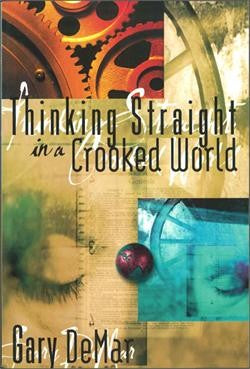Gary mentions five encouraging signs that he has seen recently about the state of the culture.
The Christian worldview does not reject this world or the things of this world as evil. All that God created is good (Gen. 1:31). All that we do should be evaluated in terms of God’s Word. “Whether, then, you eat or drink or whatever you do, do all to the glory of God” (1 Cor. 10:31). Since there is no afterlife and no authority greater than the individual for the naturalist, worldly pleasure without the threat of consequences in either this life or the next are man’s only reasonable pursuits.
For secularism, all life, every human value, every human activity must be understood in light of this present time. The secularist either flatly denies or remains utterly skeptical about the eternal. He either says there is no eternal or if there is we can know nothing about it. What matters is now and only now. All access to the above and beyond is blocked. There is no exit from the confines of this present world. The secular is all that we have. We must make our decisions, live our lives, make our plans, all within the closed arena of this time—the here and now.[1]
The following proposition is fundamental to the naturalistic or secular worldview: “As non-theists, we begin with humans, not God, nature not deity. Nature may indeed be broader and deeper than we now know; and new discoveries, however, will but enlarge our knowledge of the natural.”[2] A significant question remains: How does the naturalist know for a certainty that any of what he believes is true since he is finite and fallible, and he is never sure that what’s true today will be true tomorrow?
In order to deal with conflicting worldviews, the Christian must presuppose distinctions, absolutes, and logical discourse. Because of the advent of bizarre assumptions about reality, it is becoming more difficult to make a case for absolutes. The Christian apologist must force, in logical terms, opposing worldview advocates to live consistently with their presuppositions.

Thinking Straight in a Crooked World
The nursery rhyme "There Was a Crooked Man" is an appropriate description of how sin affects us and our world. We live in a crooked world of ideas evaluated by crooked people. Left to our crooked nature, we can never fully understand what God has planned for us and His world. God has not left us without a corrective solution. He has given us a reliable reference point in the Bible so we can identify the crookedness and straighten it.
Buy NowGary mentions five encouraging signs that he has seen recently about the state of the culture. While most of them aren’t the signs that most Christians would be looking for, they each show that foundational beliefs are changing in a major way. Christians need to be informed and aware of what’s happening and always ready to bring the salt and light of the Gospel and a biblical worldview every area of life.
Click here for today’s episode
Click here to browse all episodes of The Gary DeMar Podcast
[1] R. C. Sproul, Lifeviews: Understanding the Ideas that Shape Society and Today (Old Tappan, NJ: Revell, 1986), 35.
[2] Paul Kurtz, ed., The Humanist Manifesto I and II (Buffalo, NY: Prometheus Books, 1973), 16.

